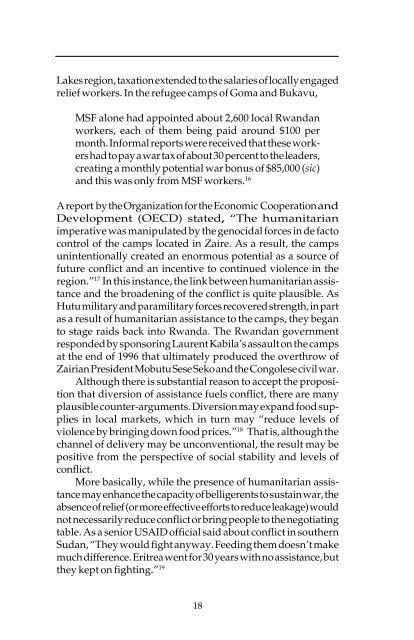Brown Cover OP 43 - The Watson Institute for International Studies
Brown Cover OP 43 - The Watson Institute for International Studies
Brown Cover OP 43 - The Watson Institute for International Studies
You also want an ePaper? Increase the reach of your titles
YUMPU automatically turns print PDFs into web optimized ePapers that Google loves.
Lakes region, taxation extended to the salaries of locally engaged<br />
relief workers. In the refugee camps of Goma and Bukavu,<br />
MSF alone had appointed about 2,600 local Rwandan<br />
workers, each of them being paid around $100 per<br />
month. In<strong>for</strong>mal reports were received that these workers<br />
had to pay a war tax of about 30 percent to the leaders,<br />
creating a monthly potential war bonus of $85,000 (sic)<br />
and this was only from MSF workers. 16<br />
A report by the Organization <strong>for</strong> the Economic Cooperation and<br />
Development (OECD) stated, “<strong>The</strong> humanitarian<br />
imperative was manipulated by the genocidal <strong>for</strong>ces in de facto<br />
control of the camps located in Zaire. As a result, the camps<br />
unintentionally created an enormous potential as a source of<br />
future conflict and an incentive to continued violence in the<br />
region.” 17 In this instance, the link between humanitarian assistance<br />
and the broadening of the conflict is quite plausible. As<br />
Hutu military and paramilitary <strong>for</strong>ces recovered strength, in part<br />
as a result of humanitarian assistance to the camps, they began<br />
to stage raids back into Rwanda. <strong>The</strong> Rwandan government<br />
responded by sponsoring Laurent Kabila’s assault on the camps<br />
at the end of 1996 that ultimately produced the overthrow of<br />
Zairian President Mobutu Sese Seko and the Congolese civil war.<br />
Although there is substantial reason to accept the proposition<br />
that diversion of assistance fuels conflict, there are many<br />
plausible counter-arguments. Diversion may expand food supplies<br />
in local markets, which in turn may “reduce levels of<br />
violence by bringing down food prices.” 18 That is, although the<br />
channel of delivery may be unconventional, the result may be<br />
positive from the perspective of social stability and levels of<br />
conflict.<br />
More basically, while the presence of humanitarian assistance<br />
may enhance the capacity of belligerents to sustain war, the<br />
absence of relief (or more effective ef<strong>for</strong>ts to reduce leakage) would<br />
not necessarily reduce conflict or bring people to the negotiating<br />
table. As a senior USAID official said about conflict in southern<br />
Sudan, “<strong>The</strong>y would fight anyway. Feeding them doesn’t make<br />
much difference. Eritrea went <strong>for</strong> 30 years with no assistance, but<br />
they kept on fighting.” 19<br />
18

















